Examples of HIPAA Compliance Badges and Why They're Helpful
Let's talk about how HIPAA compliance badges can be beneficial and look at some examples pulled from that Google image search from earlier.
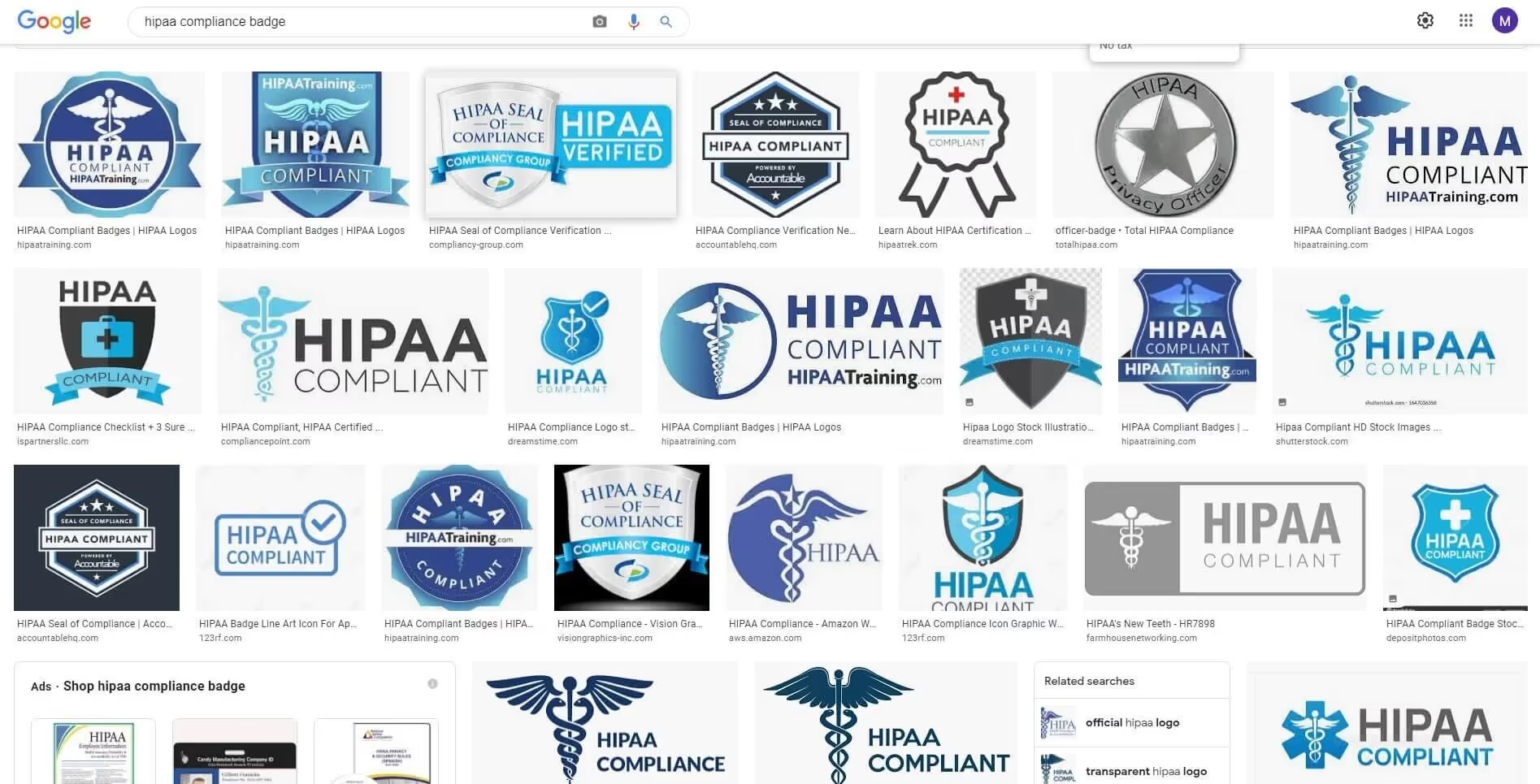
If you Google image search for “HIPAA Compliance Badge”, you’d come across millions of different images that all assure adherence to the law.
That’s all well and good, except for one key issue.
You see, the Department of Health and Human Services (HHS) doesn’t officially recognize certificates as proof of compliance. Thus, it’s safe to say that badges don’t prove compliance either.
So why do companies issue a badge? Why would a company post a badge on their website that states that they’re HIPAA compliant?
The answers aren’t straightforward. There are benefits to using these seals. However, badges and the websites that use them can be misleading.
Let's talk about how HIPAA compliance badges can be beneficial and look at some examples pulled from that Google image search from earlier.
Benefit 1: Ease of Mind
Healthcare is a stressful industry. That might be the understatement of the year considering the rates of burnout among healthcare professionals.
Therefore, you need to do what you can to make your life easier and less stressful.
HIPAA badges make it easy to see who completed the training and who didn’t. After all, it can be as simple as looking at a list of names with a checkmark next to it.
It can also mean it is easy to see who needs to receive disciplinary action because the employee failed to complete and/or pass the mandatory training.
Hopefully, it doesn’t come to that, but at least you can have peace of mind you didn’t miss something related to every employee receiving training.
Example 1: HIPAATraining.com
Certifications and badges don’t guarantee compliance. Just because you or your employees follow the training and answer the questions doesn’t mean that mistakes won’t happen down the road.
However, different companies provide HIPAA badges upon the completion of training. The image below is an example of a badge you can download from HIPAATraining.com. The website even allows you to generate your own version.
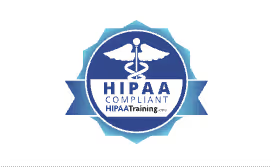
There are two main problems with this. First, the HHS doesn’t recognize such badges for an entire organization.
The HHS states on its website that “Certifications do not absolve Covered Entities of their legal obligations under the Security Rule. Moreover, the performance of a ‘certification’ by an external organization does not prevent HHS from subsequently finding a security violation.”
The second problem is that anyone can generate their own badge from this website and suddenly claim that they’re “HIPAA compliant”.
The website does warn that the HHS or OCR doesn't endorse education providers or materials. Any marketing claims that state otherwise is misleading.
Furthermore, while a certificate of competency demonstrates knowledge of HIPAA, it doesn’t absolve a Covered Entity of its compliance obligations.
Benefit 2: Proof and Verification
Healthcare organizations are often compared to a colony of bees. They’re extremely busy and staff is going every which way while trying to help patients.
Because of this organized chaos, auditing can feel like it puts a halt to the daily hustle.
Sometimes it can feel like auditing can sneak up on an organization and catch you unprepared. How do you help the auditing process go smoothly?
You can provide proof that each employee took the HIPAA training.
One solution is with timestamps. You can show when each employee completed the training, show how long it took them to watch and read each section of the training, and show the results of the questions provided.
Another potential solution is what this blog post is all about, HIPAA compliance badges. Show which employees received badges, provide evidence of the requirements an employee must meet to receive a badge, and how the badge expiration process and renewal process works.
Example 2: Accountable
Accountable recognizes that there’s no official certification process from the HHS or the OCR.
However, its website states that an organization can become HIPAA certified. As I mentioned above, an organization can’t become certified. Only employees can become temporarily certified.
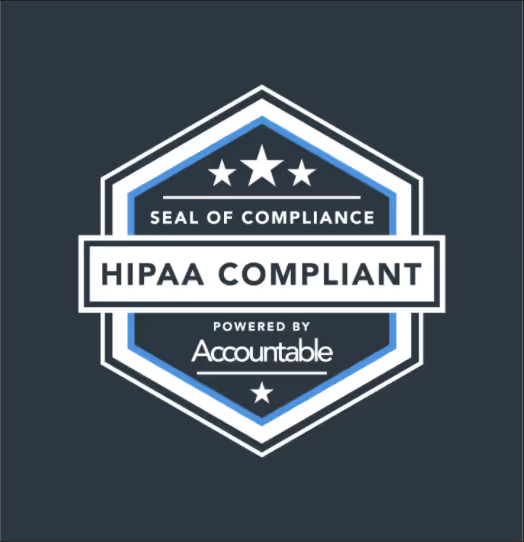
Therefore, a “seal of compliance” like this one doesn’t do much good since it won’t help with an auditing process. If the company made similar badges for individual employees, the proof would be more effective.
Benefit 3: Visual Proof
Badges can act as visual proof that an employee took and passed their HIPAA training for the current period.
This is a good place to mention that HIPAA compliance for employees is temporary.
You see, the HHS says that compliance is an ongoing process and thus, they don’t enforce any type of HIPAA-related certification. Its philosophy is that just because you’re HIPAA compliant now doesn’t mean that your organization will be compliant five years from now.
Employees should take HIPAA training regularly. Most employers administer the training once a year. Therefore, every time the employee takes the training, you have to renew the compliance badge(s).
If the badge has a label with the year the current year, it further helps prove that the employee maintains compliance and actively passes HIPAA training.
Example 3: Etactics
Below is an example certification that Etactics provides for the completion of its HIPAA training modules.
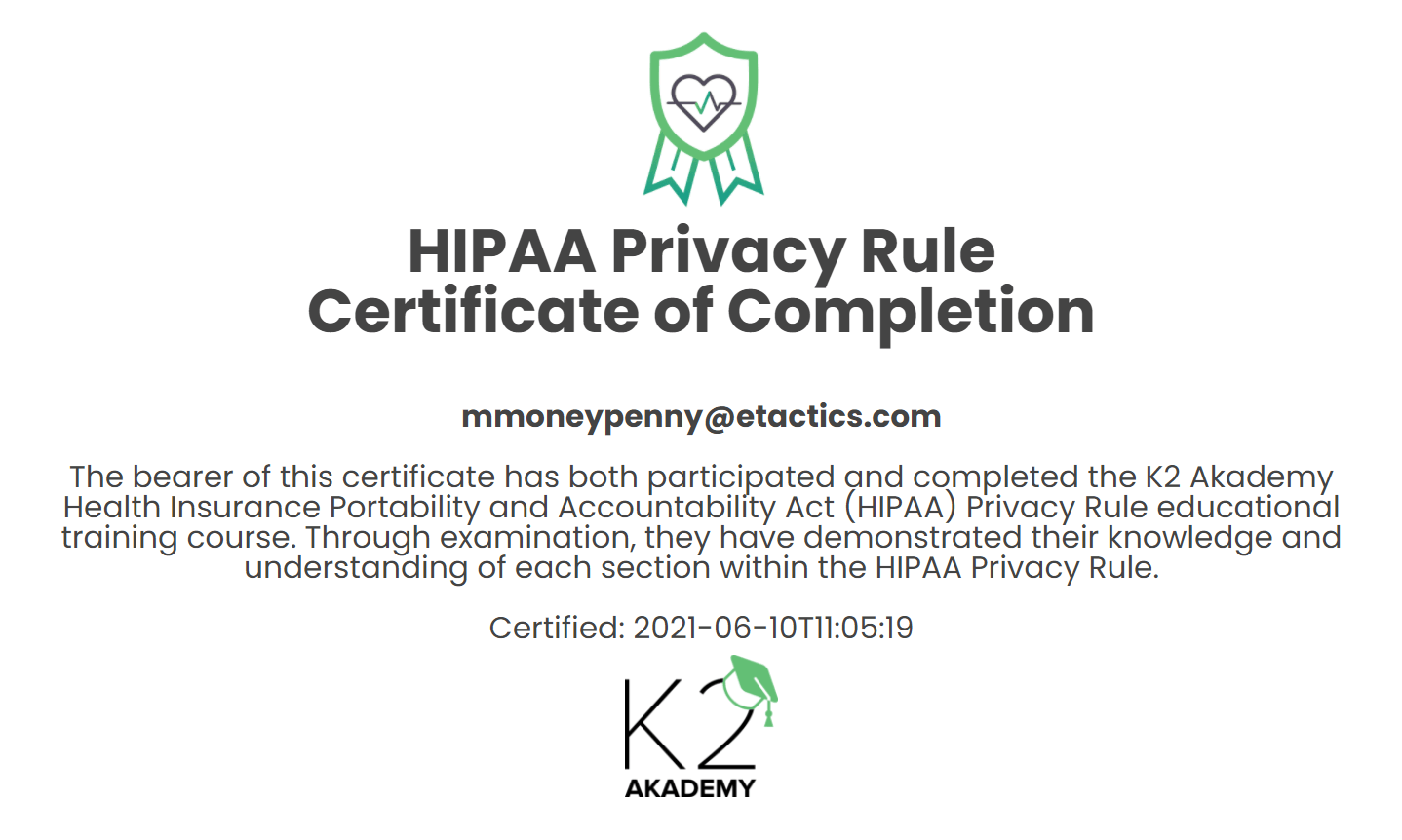
This is quite a contrast compared to Example 1 and Example 2. Both of the previous examples assume that the organization can become HIPAA compliant. They can show off a certification or a badge to show proof of compliance.
We do things a little differently.
Our badges are embedded within the individual certifications, because that’s what holds the most value.
We also don’t state that the bearer of the certificate is HIPAA compliant. Instead, we state that they’ve demonstrated their knowledge and understanding of each section provided within the HIPAA module that they completed.
Benefit 4: Instill Confidence
Not only can HIPAA badges create a feeling of accomplishment for the healthcare employee, but they can also help patients make up their minds about the organization.
Patients need to be able to trust a healthcare organization. They need to know you have their best interest at heart. They need to have your assurance that their medical and financial information is safe and secure. You need to make sure they understand their information will stay safe in the future.
HIPAA badges help with this communication process.
Having proof of HIPAA compliance helps patients feel more secure about their care. They can feel at ease that their medical records are safe and secure. After all, the doctors, nurses, and other staff members took training about the law’s Privacy Rule, Security Rule, Breach Notification Rule, and other related topics.
Patients will also feel more comfortable knowing that the healthcare workers keep up-to-date on the various training necessary to keep them safe in any way necessary.
I mean, you need to keep training up to date anyways. The Security and Privacy Rule says that you need to take training “periodically” or “regularly”. This often translates to mandatory training about once a year. So you should communicate with your patients that you are compliant and follow all of the HIPAA guidelines.
Example 4: Midaxo
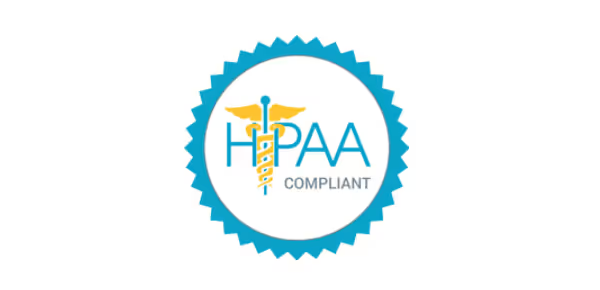
On the Midaxo website, the company explains that HIPAA requires that the covered entities and their business associates sign Business Associate Agreements (BAA). Only customers with a signed BBA can store and process PHI using Midaxo products.
Midaxo understands that there’s no certification for the Omnibus HIPAA compliance but they still want companies under the BBA to have the Midaxo HIPAA certification. They claim this is because they want to ensure the safety of all PHI stored in their systems.
The problem is...you guessed it. Companies can’t become HIPAA compliant. Employees can become temporarily HIPAA certified, but a company as an entity cannot say the same.
Therefore, Midaxo can’t ensure that a company as an entity complies with all of the HIPAA requirements.
Conclusion
As you can see, there are benefits to posting a badge conveying HIPAA compliance.
Badges can help improve relationships with customers and help develop trust. Patients need to feel safe and secure about the treatment they are receiving. They also need to make sure their health and financial information stay secure.
Badges serve as a form of proof that employees took and passed the HIPAA training. Now companies can’t exactly be HIPAA certified, but employees can have temporary certifications. A badge shows the completion and passing of the HIPAA training.
Furthermore, a healthcare organization needs to prove that every employee completes and passes the training. How do you prove that this is the case? A badge issued upon completion for that year’s training certainly helps!
Lastly, if you would like to issue your employees badges for the completion of different training modules for all of the reasons discussed above, we can help.
Emphasize your product's unique features or benefits to differentiate it from competitors
In nec dictum adipiscing pharetra enim etiam scelerisque dolor purus ipsum egestas cursus vulputate arcu egestas ut eu sed mollis consectetur mattis pharetra curabitur et maecenas in mattis fames consectetur ipsum quis risus mauris aliquam ornare nisl purus at ipsum nulla accumsan consectetur vestibulum suspendisse aliquam condimentum scelerisque lacinia pellentesque vestibulum condimentum turpis ligula pharetra dictum sapien facilisis sapien at sagittis et cursus congue.
- Pharetra curabitur et maecenas in mattis fames consectetur ipsum quis risus.
- Justo urna nisi auctor consequat consectetur dolor lectus blandit.
- Eget egestas volutpat lacinia vestibulum vitae mattis hendrerit.
- Ornare elit odio tellus orci bibendum dictum id sem congue enim amet diam.
Incorporate statistics or specific numbers to highlight the effectiveness or popularity of your offering
Convallis pellentesque ullamcorper sapien sed tristique fermentum proin amet quam tincidunt feugiat vitae neque quisque odio ut pellentesque ac mauris eget lectus. Pretium arcu turpis lacus sapien sit at eu sapien duis magna nunc nibh nam non ut nibh ultrices ultrices elementum egestas enim nisl sed cursus pellentesque sit dignissim enim euismod sit et convallis sed pelis viverra quam at nisl sit pharetra enim nisl nec vestibulum posuere in volutpat sed blandit neque risus.

Use time-sensitive language to encourage immediate action, such as "Limited Time Offer
Feugiat vitae neque quisque odio ut pellentesque ac mauris eget lectus. Pretium arcu turpis lacus sapien sit at eu sapien duis magna nunc nibh nam non ut nibh ultrices ultrices elementum egestas enim nisl sed cursus pellentesque sit dignissim enim euismod sit et convallis sed pelis viverra quam at nisl sit pharetra enim nisl nec vestibulum posuere in volutpat sed blandit neque risus.
- Pharetra curabitur et maecenas in mattis fames consectetur ipsum quis risus.
- Justo urna nisi auctor consequat consectetur dolor lectus blandit.
- Eget egestas volutpat lacinia vestibulum vitae mattis hendrerit.
- Ornare elit odio tellus orci bibendum dictum id sem congue enim amet diam.
Address customer pain points directly by showing how your product solves their problems
Feugiat vitae neque quisque odio ut pellentesque ac mauris eget lectus. Pretium arcu turpis lacus sapien sit at eu sapien duis magna nunc nibh nam non ut nibh ultrices ultrices elementum egestas enim nisl sed cursus pellentesque sit dignissim enim euismod sit et convallis sed pelis viverra quam at nisl sit pharetra enim nisl nec vestibulum posuere in volutpat sed blandit neque risus.
Vel etiam vel amet aenean eget in habitasse nunc duis tellus sem turpis risus aliquam ac volutpat tellus eu faucibus ullamcorper.
Tailor titles to your ideal customer segment using phrases like "Designed for Busy Professionals
Sed pretium id nibh id sit felis vitae volutpat volutpat adipiscing at sodales neque lectus mi phasellus commodo at elit suspendisse ornare faucibus lectus purus viverra in nec aliquet commodo et sed sed nisi tempor mi pellentesque arcu viverra pretium duis enim vulputate dignissim etiam ultrices vitae neque urna proin nibh diam turpis augue lacus.




